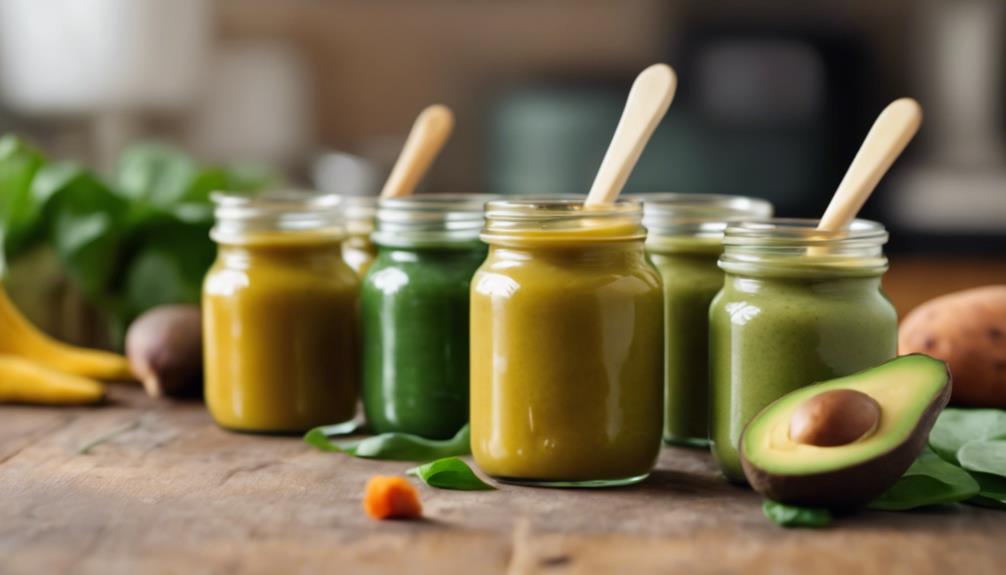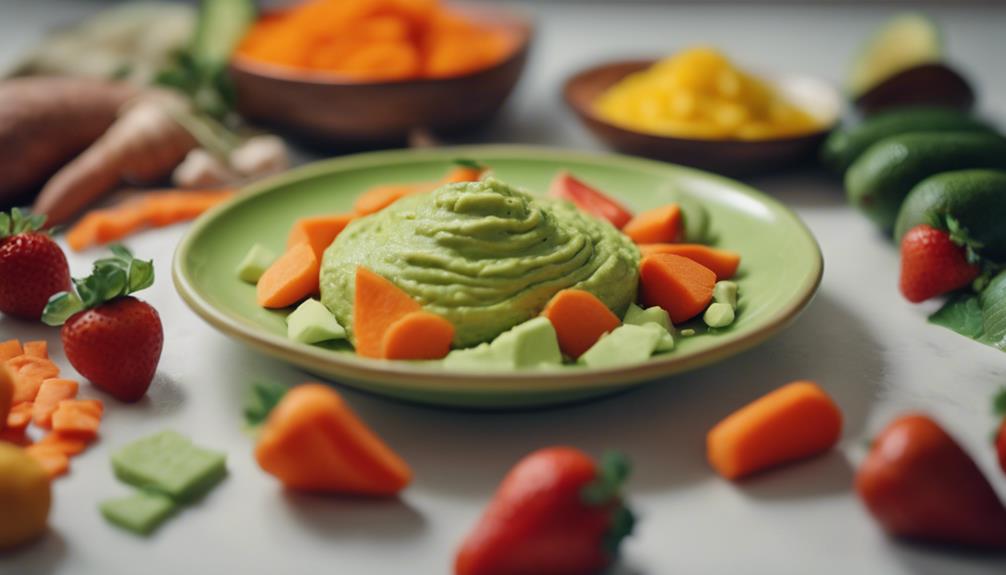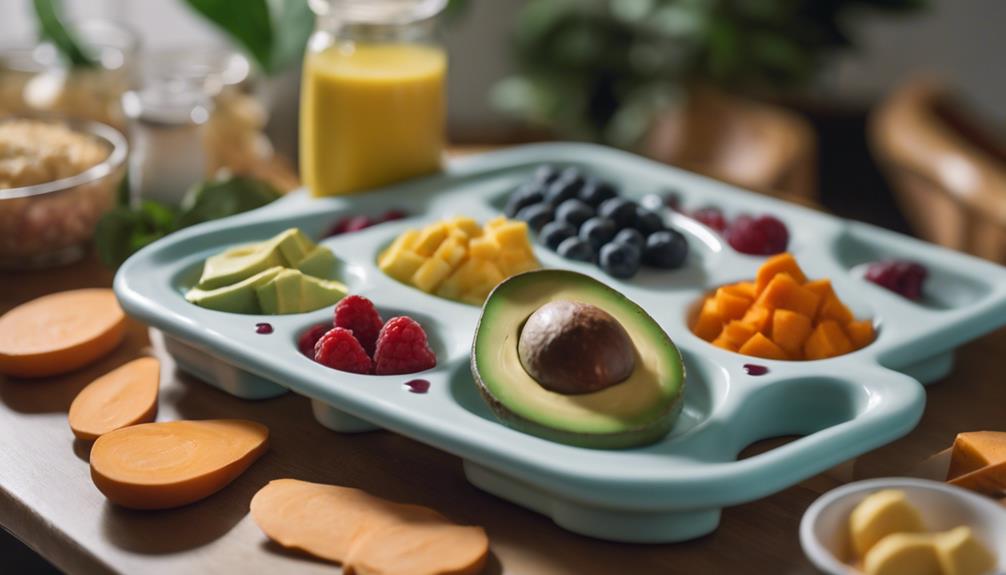For delicious and nutritious baby food, begin with single-ingredient purees before combining flavors. You will need an immersion blender and storage containers as essential tools. Seek out recipes containing fruits, vegetables, grains, and iron-rich foods. Ensure freshness by preparing homemade meals. Store in the refrigerator for up to 3 days or freeze in ice cube trays for up to 3 months to preserve nutrients. Include healthy fats for brain development. Use fresh, organic ingredients free of additives. Experiment with various textures and flavors to suit your baby’s preferences. Create engaging mealtimes with different presentations. Keep an eye on nutritional balance and growth. Homemade meals offer the ability to control ingredients and adapt recipes to your baby’s needs.
Key Takeaways
- Experiment with flavor combinations using fresh ingredients for variety and nutrition.
- Include a variety of fruits, vegetables, whole grains, and iron-rich foods in recipes.
- Control quality and sugar content by making homemade baby food.
- Introduce herbs and spices for added flavor and adapt recipes to baby's preferences.
- Ensure balanced meals with healthy fats, proteins, and vitamins; consult with a pediatrician for guidance.
How to Introduce Baby Foods
When starting to introduce baby foods, assess your little one's readiness and begin with simple, single-ingredient purées.
Solid foods can be introduced around 6 months of age, which may help decrease allergy and asthma risks. Look for signs like your baby being able to sit up, showing interest in food, and being able to swallow.
For 4-6-month-olds, start with purées like banana, avocado, or sweet potato. As your baby grows, gradually progress to thicker purées with multiple ingredients for 6-9-month-olds.
For 9-12-month-old babies, you can introduce chunkier purées and mashes with a variety of flavors. Experiment with different flavor combinations to introduce your baby to new tastes and textures.
Making your own baby food at home allows you to manage the ingredients and maintain freshness.
Stay tuned for delicious and nutritious baby food recipes to try out with your little one.
Essential Supplies for Homemade Baby Food

Consider investing in the essential supplies needed for preparing homemade baby food, ensuring you have the right tools for blending, storing, and cooking ingredients.
A hand-held immersion blender is a key item for effortlessly pureeing fruits and vegetables to the perfect consistency for your little one.
To help with portioning and storing homemade baby food, ice cube trays are highly recommended, allowing you to freeze individual servings for later use.
Small containers with lids are ideal for storing baby food in the refrigerator for a few days, maintaining freshness and convenience.
Don't forget a vegetable peeler to easily remove skins from produce before blending, ensuring a smooth texture for your baby's meals.
Additionally, a steamer basket is a valuable tool for cooking vegetables and fruits before blending, preserving their nutrients and flavors.
These supplies are essential for efficient blending, portioning, and storing of homemade baby food, making meal preparation a breeze.
Nutritious Baby Food Recipes Guide

To create nutritious meals for your baby, explore a variety of baby food recipes that incorporate wholesome ingredients for optimal growth and development. Homemade baby food recipes are a great way to guarantee your little one receives essential nutrients.
Include a mix of fruits, vegetables, whole grains, and iron-rich foods like spinach or lentils in your recipes. These ingredients not only provide a range of vitamins and minerals but also introduce different tastes and textures to your baby's palate.
By making your own baby food, you can control the quality and freshness of the ingredients, giving your baby a higher nutritional value compared to store-bought options. Remember, introducing a variety of nutritious foods early on can help set the stage for healthy eating habits later in life.
Get creative in the kitchen and enjoy the process of nourishing your baby with homemade, wholesome meals.
Storing Homemade Baby Food Safely

When storing homemade baby food, remember to keep it in a sealed container in the refrigerator for up to 3 days to guarantee freshness.
For longer storage and nutrient preservation, consider freezing baby food in ice cube trays or a freeze dryer for up to 3 months.
These simple tips will help you maintain the quality and safety of your homemade baby food.
Safe Storage Guidelines
For safe storage of homemade baby food, refrigerate the prepared meals for up to 3-4 days to maintain freshness and nutritional quality. When storing homemade baby food in the refrigerator, it's essential to use airtight containers to prevent contamination and preserve the food's integrity.
Utilizing ice cube trays for freezing small portions of baby food allows for convenient serving sizes and extends the storage lifespan to 3-4 months. A hand-held immersion blender is ideal for creating homemade baby food, ensuring a smooth and consistent texture that's safe for your little one to consume.
Following these storage guidelines not only maintains the nutritional value of the food but also upholds food safety standards, reducing the risk of potential health hazards. By adhering to proper storage practices, you can enjoy peace of mind knowing that your homemade baby food is both delicious and safe for your baby to eat.
Freezing Homemade Baby Food
Refrigerating homemade baby food for up to 3-4 days is a great way to guarantee freshness, but when you want to extend its lifespan, freezing the prepared meals is an excellent option.
When it comes to freezing homemade baby food, there are some key points to keep in mind:
- Homemade baby food can be stored in the freezer for up to 3-4 months.
- Use ice cube trays or freeze dryer for convenient storage of baby food.
- Freezing homemade baby food helps in preserving nutrients and flavors.
- Thaw frozen baby food cubes in the refrigerator overnight before serving.
Refrigeration Tips
How can you guarantee the safe storage of homemade baby food in the refrigerator?
It's vital to store homemade baby food properly to maintain freshness and ensure it remains safe for your little one.
Use sealed containers when storing homemade baby food in the refrigerator to prevent contamination and maintain quality.
Homemade baby food can be stored in the refrigerator for up to 3-4 days, after which it should be discarded to avoid spoilage.
Ice cube trays can be a convenient tool for portioning and freezing homemade baby food for longer storage periods while preserving nutrients and flavors.
By following recommended storage guidelines, you can retain the goodness of homemade baby food and provide your baby with nutritious meals.
Proper refrigeration of homemade baby food is important for both safety and taste, so make sure to handle and store it with care.
Tips for Making Delicious Baby Meals

Consider incorporating a variety of fresh, organic ingredients when preparing delicious meals for your baby. Experiment with different combinations of foods to introduce a range of flavors to your little one.
Here are some tips to help you create tasty and nutritious meals for your baby:
- Mix Sweet and Savory Flavors: Combining sweet foods like sweet potatoes with savory ingredients can create a delicious balance.
- Keep it Simple: Opt for easy recipes that are quick to prepare, such as pureed fruits or steamed vegetables.
- Choose the Best First Foods: Sweet potatoes are a great option for homemade baby food due to their creamy texture and natural sweetness.
- Add Healthy Fats: Incorporating fats like avocado or coconut oil can enhance the flavor and support your baby's brain development.
More Homemade Baby Food Ideas

To expand your repertoire of homemade baby food options, here are some creative ideas to add variety and nutrition to your little one's meals.
When preparing homemade baby food, it's essential to introduce a diverse range of foods to help your baby develop a taste for different flavors and textures. Foods like sweet potatoes, avocados, and bananas are great options to include in your homemade baby food recipes. Make sure to gradually introduce new foods to monitor for any allergies or sensitivities your baby may have.
Baby oatmeal is another nutritious choice that can be easily made at home by grinding oats into a fine powder and cooking them with water or breast milk.
Batch cooking can be a time-saving strategy when preparing homemade baby food. By making larger quantities and freezing portions in ice cube trays, you can have convenient servings ready to go whenever your baby needs a meal.
Commercial baby foods can also be used occasionally for convenience, but homemade options allow you to control the quality and freshness of the ingredients. Experimenting with different recipes and flavors can make mealtime an enjoyable experience for both you and your baby.
Frequently Asked Questions
What Is the Healthiest Way to Make Baby Food?
To make baby food healthily, use fresh, organic ingredients, steam or boil fruits and veggies, skip sugar and salt, and avoid artificial additives. Control ingredients with a blender for smooth purees, ensuring a nutritious meal for your baby!
What Is the #1 Most Important Food for Your Baby?
Breast milk is the #1 most important food for your baby. It provides essential nutrients, antibodies, and supports their immune system. Breastfeeding is linked to reduced risks of infections, allergies, obesity, and chronic diseases later in life.
What Are the Best Nutrient Rich Foods for Babies?
To give your baby a healthy start, focus on nutrient-rich foods like iron-rich spinach and avocado, omega-3-packed salmon, and protein-filled Greek yogurt. These choices are essential for your little one's growth and development.
How to Make Good Tasting Baby Food?
To make good tasting baby food, start by incorporating a variety of fruits, vegetables, and spices. Enhance flavors with herbs like thyme or mint. Experiment with delicious combinations like apples with cinnamon or sweet potatoes with nutmeg.
Conclusion
In summary, creating delicious and nutritious baby food doesn't have to be a challenging task. By following these simple recipes and tips, you can provide your little one with healthy meals that they'll love.
Remember to introduce new foods gradually, use the right supplies, and store homemade baby food safely.
With a little creativity and effort, you can guarantee that your baby gets the best start possible when it comes to their nutrition. Happy cooking!










